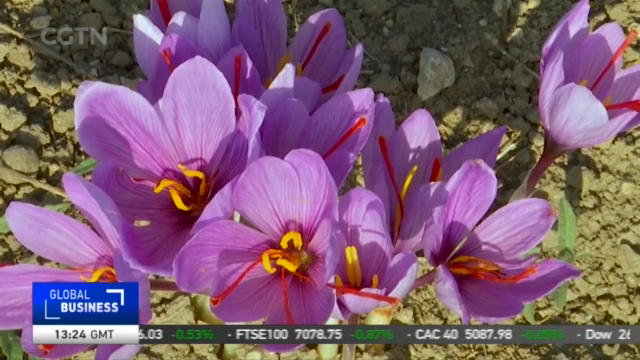
22:46, 09-Nov-2018
Greece's 'Red Gold': Saffron trade blooms in wilted economy
Updated
22:29, 12-Nov-2018
02:39

From flowers to the world's most expensive spice, saffron is a valuable trading commodity for the Greeks to hold on to when their country's economy is in crisis. Xia Cheng has the story.
This small purple flower produces the most costly spice in the world and it has been a saviour for many during Greece's nine-year economic crisis.
From its red threads, called stigmas, the rich red spice of Saffron, - referred to as red gold - is made.
The saffron growing area in north-western Greece is called Kozani.
Greece's unemployment rate stands at 23.5 percent but this area provides guaranteed work opportunities.
And many folks are returning from big cities for the jobs.
ZISIS KYROU, AGED 34 RETURNING FOR WORK "It was difficult to find work in your field during the crisis, particularly in civil engineering, because there was no construction. Inevitably, as we've been taught how to cultivate saffron from our parents and grandparents and we knew our way about the fields, I thought saffron cultivation would provide me with a good income. It was an option - my return - that I don't regret, and I would tell other young people who are struggling to find jobs, to become involved with cultivating saffron."
Saffron is expensive due to its labor-intensive processing.
Seventy percent of Greece's saffron exports go to major culinary markets including the United States, France, Germany, the United Arab Emirates and Japan.
Local saffron production has increased more than 130 times between 2000 and 2018.
The local co-operative is now in talks to enter the China market, and a Chinese business delegation recently visited the area.
The Chinese are weighing between Greece and other production areas like Iran, the leading saffron producer globally, and India, the second largest.
NIKOS PATSIOURAS PRESIDENT OF THE CO-OPERATIVE OF SAFFRON "We are very very concerned with quality because that is our weapon, it is the weapon we have so that no competitor can reach us. Every day, every year that goes by we try to make something better. Its aroma, its taste, they are all stronger. If a chef needs to put five threads of saffron in a serving, he will put only two of ours."
That blast of flavor on the taste buds is translating into cash for the local economy, and the export revenues are supporting more hirings in the area.
Although it's a traditionally labor-intensive work, it's a non-cyclical business that Greece needs to counter the current global economic weakness.
XC, CGTN.

SITEMAP
Copyright © 2018 CGTN. Beijing ICP prepared NO.16065310-3
Copyright © 2018 CGTN. Beijing ICP prepared NO.16065310-3